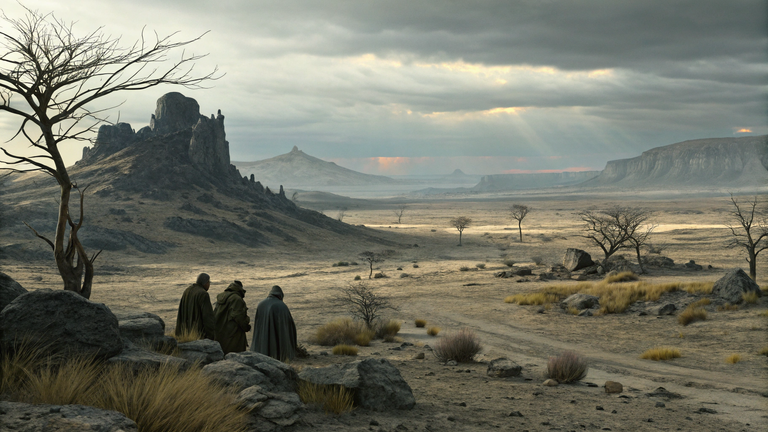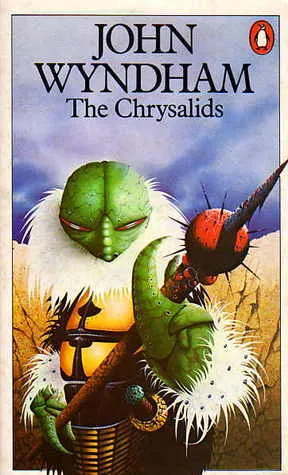I know it's a little late for this topic—but I don’t suppose it matters. A memory is a memory, and does not stick to deadlines. I’ve been contemplating my favorite childhood book ever since @ericvanwalton posted the topic, but I haven’t been able to write, as how is it possible to choose? But there’s one that I keep returning to again and again, so I guess that’s the one that made the most impression on me.
Like many teen books, The Chrysalids is a coming-of-age story—yet this one unfolds in an apocalyptic wasteland. The main character, David Storm, has telepathy, something he knows intuitively he must hide. He lives in a small farming community where any mutation - perhaps an extra toe on a newborn baby or extra ear on corn - is brutally and ruthlessly destroyed, no matter the argument against. It's a kind of extremism which sets the tone for David's - and others like him - suppress who you are, or die.

An imagined scene from the Chrysalids with Peakd's internal AI.
As a teen, this book written in the '50's was really relatable. First, the telepathy. When you're a kid, the idea of having an unusual ability is really appealing, let alone one that lets you share your thpughts without fumbling for the language to adequately express yourself. I had a degree of that with my best friend - the shared jokes, the emotional connection - but to communicate via thoughts was the ultimate connection, and utterly unbreakable. For David and his small group of telepathic friends and cousins, it's a small island in a sea of suspicion which starts when the youngest, Petra, gives away her ability.

I had this copy of the book.
The stakes in the Chrysalids were terrifying - there was an undercurraent of danger all the way through. For them it wasn't fun - it was about survival in a community that was ready to kill what they felt were abominations. They'd be exposed, branded, and destroyed.
David's inner turmoil is poignant - he yearns to belong but knows he can never be accepted in a rigid, rule bound world. The cost of being different - every teenagers nightmare - is huge. There is no room for deviation. The horror of this is brought home when David sees the imprint of a footprint belonging to a girl he met who lived in the forest with her parents. The tell tale six toed print is haunting - the reader understands perhaps before David that Sophie's life, and her parents, is in danger.
'Who is she?' he repeated. 'She's not one of the -- ' He broke off suddenly. I looked up and saw that he was staring down at something beside me. I turned quickly. On the flat rock was a footprint, still undried. Sophie had rested one foot there as she bent over to tip her catch into the jar. The mark was still damp enough to show the print of all six toes clearly. I kicked over the jar. A cascade of water and struggling shrimps poured down the rock, obliterating the footprint, but I knew, with a sickly feeling, that the harm had been done.
As David connects with others like him, he finds a sense of community that feels fragile yet exhilarating. Bound together by a shared secret, they know they are hunted, their existance precarious. For me, whilst I didn't have telepathy or live in a post-apocalyptic wasteland, I did know what it was like to want to hide parts of myself, to long for a group of people who would understand me. This was deeply intriguing to me.
It was also the begining of a life long love of the apocalypse in all it's forms. Like another book I was reading at the time, Z for Zacariah, it made me thing deeply about what would form from the ashes of a society destroyed by a catastrophic event. Even back then I was deeply disatisfied with how the world was, and for me, a holocaust gave a chance to do things differently. In the 'Chrysalids', the nuclear holocaust looms over the story not just as a backdrop but almost as a character, the cause of everything that had gone wrong. The land is unstable, full of 'badlands' where radiation still lingers, twisting plants and people into grotesque forms as haunting reminders of the past and warnings of our capacity for self destruction. Arguably, the community of Waknuk clings to such rigid, cruel lawas to maintain order in a world where the line between life and death is razor sharp. They're survival strategies born out of terror, aiming to keep at bay the threats to our fragile self existence.
Yet even here, there are opportunities to see gifts in the consequences of the fallout. Here, telepathy and extra toes are things that might help humanity adapt in a changing world. Just because it's different to what went before doesn't mean it's bad. The world has been irrevocably changed, yes, but how we deal with the differences change brings matters. Whilst I couldn't articulate it back then, I think I was intrigued with how things could be different in a good way. Amid devastation, there’s hope, and a chance to change the things that aren't so good about the world, like persecution.
I wish they'd do a modern version - this sounds very British and the voices are bloody annoying!
Telepathy, in the Chrysalids, might have been the first time I'd thought about 'oneness' - I'd study and understand this concept over years of yoga study and mediation, almost an extension of these fledging thoughts of how connection drives humanity, not separation:
“And again there are no words. Words exist that can, used by a poet, achieve a dim monochrome of the body's love, but beyond that they fail clumsily. My love flowed out to her, hers back to me. Mine stroked and soothed. Hers caressed. The distance - and the difference - between us dwindled and vanished. We could meet, mingle, and blend. Neither one of us existed any more; for a time there was a single being that was both. There was escape from the solitary cell; a brief symbiosis, sharing all the word ...”
And even the concept of impermanence, of a deep understanding that the only constancy in life is change. Man's arrogance is that he believes he is immune to change - that he can keep on going without consequences. To not adapt and learn and grow is death. Waknuk cannot survive the apocalypse because it refuses to adapt. Survival, I began to understand, depends on adapting - something we are not doing a very good job at as humans now.
“Your work is to survive. Neither his kind, nor his kind of thinking will survive long. They are the crown of creation, they are ambition fulfilled—they have nowhere more to go. But life is change, that is how it differs from the rocks, change is its very nature. Who, then, were the recent lords of creation, that they should expect to remain unchanged?”
I would teach the Chrysalids one year to a group of Year 9 students. I thought they'd love it as much as I did - some, I think, did. But most of them couldn't get past the fact that David falls in love with his cousin, something that hadn't stood out to me in all the many times I'd read the book. Sigh.
With Love,

Are you on HIVE yet? Earn for writing! Referral link for FREE account here



